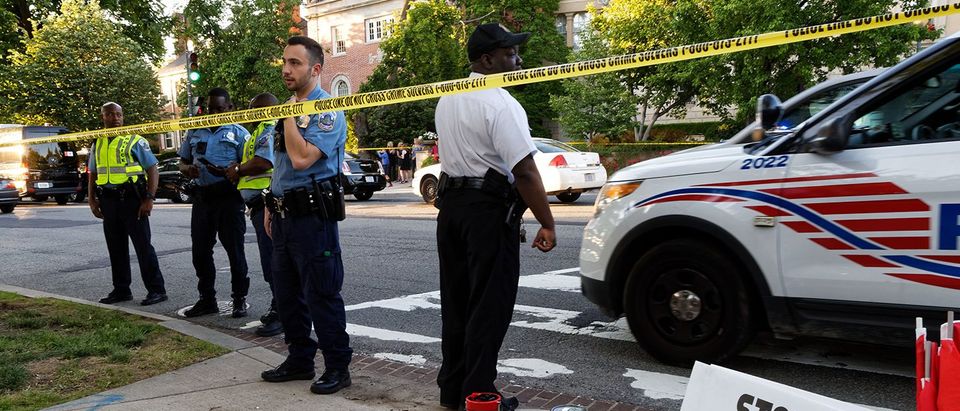On Tuesday, May 16, 2017, with the Turkish President Erdogan silently watching, his guards violently attacked a group of a peaceful protesters demonstration outside of the Turkish Consulate’s Residence in Washington DC. This was not the first time Erdogan’s bodyguards have attacked peaceful protesters outside of Turkey.
Last year on March 31, they attacked journalists in front of the Brookings Institution — I was one of them. Then on January 4, 2016 while on a trip to Ecuador, Erdoğan’s personal security guards also attacked a group of Ecuadorian women who that started chanting “Asesino Fuera/Murderer Out” in the conference room where President Erdogan was to speak.
When I consider the question of why Erdogan’s bodyguards keep attacking protesters, I do revisit my old days in the Turkish National Police and think about the training the Turkish police and security guards receive and the attitudes, cultural and social views they adopt and tend to share. Back in 1999 when I joined the Turkish National Police Counter Terrorism Department Headquarters, I met with a ranking official who was known as abusive official but was held in very high regard by his colleagues and the low ranking police officers.
Normally, it is odd for police officers to respect someone known for gratuitous and abusive behavior. I eventually learned about the reason for this high regard — he had shot and killed a pro-PKK protester in front of Turkish Embassy in Switzerland in 1999. Because of his “heroic” act, he received the highest protection from the Turkish government, including changing his name, a 24-hour bodyguard protection, and other perks. Honestly, at the time I, too, admired him – mainly because I thought that what he did was a really “brave” act, committed for sake of the Turkish nation.
At the Turkish National Police Academy, we were taught that those Kurdish protesters in the European diaspora are all PKK members and that the West is helping them solely in order to create internal divisions within Turkey. I don’t recall any lecture at the Turkish National Police Academy or at job training, that taught us how to differentiate between terrorists, militants, supporters, group sympathizers, or just opposition figures. We were taught that anyone who stands against the government and supports the Kurds is also a terrorist. During my years at the Counter Terrorism Department at the Turkish National Police Headquarters, I never heard a discussion or an analysis of who the protesters in front of Turkish embassies in the Western countries may be. Could they be the ones whose houses were burned by the Turkish military, whose relatives were tortured in the hands of the Turkish security agencies, and who were silenced in Turkey and suffered from the Turkish state security policies leaving them no choice but escape to the West? Since then I have learned the many nuances of Turkey’s policy towards the Kurdish question, the policy that included a tremendous use of violence, including government suppression, extra-legal killings, and torture. This Turkish policy towards opponents is not unique to the Kurds.
Now, because of my critical stance against President Erdogan, I am as well officially designated as a “terrorist” by the Turkish government. When last year on March 31, 2016, I went in my capacity as a journalist to the Brookings Institution to cover Erdogan’s talk, I saw intense hatred in the eyes of my former colleagues, Erdogan’s bodyguards, many of whom know me personally. Indeed, as soon as they saw me they started acting as if they have finally come upon the biggest enemy of the state and rushed to attack me both verbally and physically. Now it is clear to me why Erdogan’s bodyguards attack peaceful protesters.
First, they see them as true terrorists. For them and the majority of Turks, including Erdogan himself, there is no distinction between a PKK militant who is using violence and a demonstrator who is peacefully exercising his right of descent. Both are just “terrorists.”
Second, those regime officials who are most vicious and violent in dealing with state opponents tend to gain enormous respect from their colleagues, bosses and the people in general. They are treated as true heroes. A major case in point is the episode from Tuesday that took place in Washington DC. While the western media and many politicians condemned the thuggish behavior of the Erdogan’s guards as inexcusable and outrageous, they were received as national defenders and heroes in Turkey.
Third, personnel simply get away with anything they do. There is no prosecution, or penalty that follows, not even cancellation of their visas. This impunity allows them to reassert their “heroism” whenever they visit, including the Western countries. Such type of “heroism” is not even limited to Erdogan’s bodyguards. Those who attacked the protesters on Tuesday were not only Erdogan’s bodyguards but also his supporters, including his “journalists.” In the video from the episode, I could easily identify one of the attackers as a “journalist” working for the Turkish State Own Anatolian News Agency’s Washington Office. He was bragging about how he managed to beat up some Kurds.
Fourth, such attacks help Erdogan domestically. They prove his tough stance against the “terrorists” abroad. They reinforce his ‘roughness’ aura and also further intimidate and silence the domestic opposition. Because of this, Erdogan never complains about the actions of his bodyguard, but in reality, he actively and passively encourages them.
Dr. Emrullah Uslu is a Turkish academic and journalist in exile. Currently, he is a faculty at the School of Public and International Affairs at Virginia International University, Fairfax, VA. He holds a Ph.D. in Middle Eastern Studies and Political Science from the University of Utah and MA in Criminal Justice from the City University of New York, and MA in Journalism from Ankara University in Turkey and a Bachelor of Arts from Turkish National Police Academy in Ankara, Turkey.


